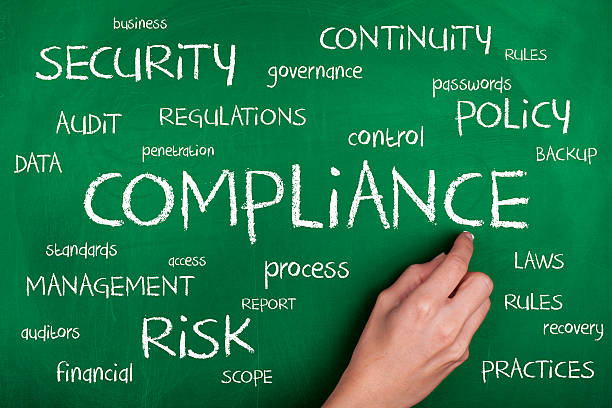Access Control Compliance: What NYC Businesses Need to Know
Jul 14, 2025

Jul 14, 2025
Security and privacy are no longer optional in business, they're legal and operational necessities. In New York City, where businesses face strict regulatory oversight and high public scrutiny, staying compliant with access control standards is critical. Whether you're a small retail store in Brooklyn or a financial firm in Manhattan, ensuring your access systems comply with local and federal security regulations protects your people, assets, and reputation.
This blog explores what access control compliance in NYC really means, which regulations you need to follow, and how your access systems should be configured to meet legal and security requirements.
Access control systems, whether using keycards, biometrics, or PIN access, do more than keep doors locked. They serve as the first line of defense in ensuring only authorized individuals gain entry to sensitive spaces. But beyond functionality, they must align with compliance standards including:
Failure to comply can lead to:
Access control compliance refers to the implementation of physical and digital access systems that meet specific laws, standards, and best practices. These systems must not only manage entry but also log user behavior, protect data, and withstand audits.
|
Industry |
Standard |
Access Control Requirement |
|---|---|---|
|
Healthcare |
HIPAA |
Restrict access to PHI; maintain detailed access logs |
|
Finance |
SOX, GLBA |
Secure areas where sensitive financial data is stored |
|
Retail/E-commerce |
PCI-DSS |
Limit access to cardholder data and log all access events |
|
Cannabis Industry |
NY State Cannabis Law |
Video surveillance, restricted area control, and ID-based logging |
|
Education |
FERPA |
Limit access to student records and maintain access logs |
Ensure individuals only access areas essential for their role.
Combine card/PIN/biometric credentials for sensitive spaces.
Security teams must monitor activity and receive alerts in case of unauthorized access attempts.
All entry and exit events must be timestamped and stored for a set retention period (typically 1–5 years depending on the industry).
All stored access data must be encrypted to comply with data protection mandates such as the NY SHIELD Act and GDPR (for businesses handling EU citizen data).
|
Compliance Feature |
Requirement |
Smartum Solution |
|---|---|---|
|
Emergency Egress |
Doors must unlock automatically during power outages |
Fail-safe locks with battery backup |
|
Access Logs |
Timestamped and detailed entry/exit records |
Centralized access log storage with reporting tools |
|
Data Protection |
Encryption of logs and access credentials |
End-to-end encrypted access systems |
|
Role-Based Access |
Least-privilege access policies |
Custom user role creation and management |
|
Regulatory Audits |
Audit-ready access reports and compliance documentation |
Automated audit trail generation |
1. Failure to Maintain Audit Trails
Missing logs or untracked user entries can result in fines and failed audits.
2. One-Size-Fits-All Access
Allowing universal access violates least-privilege principles.
3. Outdated Firmware or Unsecured Systems
Legacy systems may lack encryption, user management, and logging capabilities.
4. Lack of User Awareness or Training
Employees often bypass protocols if unaware of compliance implications.
Smartum specializes in NYC-compliant access control systems, with services tailored to:
When selecting an access control system, ensure it includes:
1. Custom Access Levels: Limit area-specific access
2. Automated Logs: For every door and user
3. Encrypted Credentials: To prevent cloning and interception
4. Alert System: For access violations or forced entries
5. Retention Policy: Store logs as long as needed per your industry
Post-pandemic, many NYC businesses operate on hybrid models, complicating physical security. A compliant access control system must:
Smartum supports remote access configurations with cloud-based dashboards, perfect for today's decentralized teams.
For businesses in NYC, compliance isn't optional; it's essential. From access logs and audit trails to data protection and role-based control, your access system must be secure, efficient, and legally sound.
By partnering with Smartum, NYC businesses gain:
Don't wait for a breach or a failed audit to take action. Contact us today!
Yes, especially those in regulated industries like healthcare, finance, cannabis, and education. Even general businesses must follow NY SHIELD Act data protection laws.
It varies by industry. Healthcare logs (HIPAA) often require 6 years. Financial (SOX) typically mandates 5–7 years.
Auditors will review system configurations, access logs, and user roles. Smartum's systems generate automated audit trails to ease this process.
Absolutely. Smartum specializes in retrofitting legacy systems with compliant software, encrypted hardware, and centralized logging.
A multi-factor access control system with role-based permissions, encrypted data storage, and detailed logging is ideal for compliance across industries.
© Smartum. All Rights Reserved.